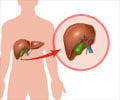Researchers have offered new hope to patients with end-stage liver disease.

Yet, the mechanism by which the infusion of CD34 stem cells improves liver function remains elusive, they said.
According to the study's corresponding author, Mark A. Zern of the University of California Davis Medical Center, Sacramento, CA, the study sought to evaluate the safety and efficacy of transplanting autologous bone marrow-derived CD34+ stem cells in 48 patients, 36 of whom had chronic, end-stage hepatitis C-induced liver disease, and 12 with end-stage autoimmune liver disease.
"For all patients there was a statistically significant decrease in peritoneal cavity fluid, or 'ascites.' There was also clinical and biochemical improvement in a large percentage of patients who received the transplantation," said Zern.
The researchers reported that they obtained "reasonable numbers of CD34+ cells" that were then "amplified and partially differentiated into hepatocyte precursor cells."
"This enabled us to transplant as many as one billion of these cells per patient. The finding of improvement in ascites in a significant number of patients is impressive and somewhat urprising, suggesting that cell transplantation might be clinically significant beyond the improvement in laboratory parameters," explained Zern.
Advertisement
The findings were reported in the journal Cell Transplantation.
Advertisement















